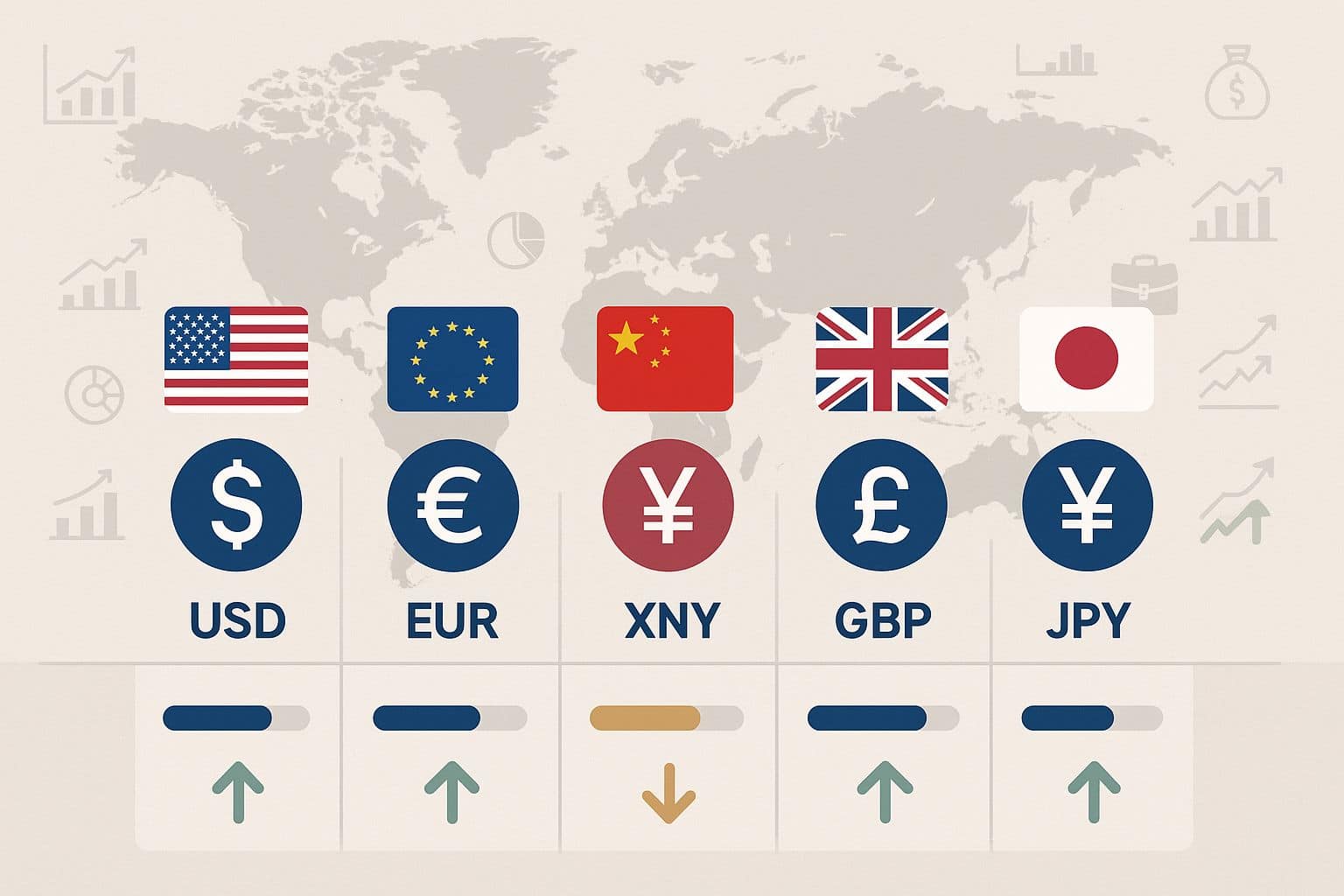Will the U.S. Dollar Stay Dominant? Currency Outlook 2025
Table of Contents
ToggleThe U.S. Dollar’s Legacy of Global Dominance
Tracing the Past
The U.S. Dollar has been on top since World War II, with the Bretton Woods Agreement of 1944, which pegged several other currencies to the dollar. After the gold standard was abolished in 1971, the dollar has since remained high due to economic power and trust in U.S. institutions.
Key Drivers of Dollar Dominance
- Reserve Currency Status: Over 58% of global foreign exchange reserves are held in USD.
- Trade and commodities: The U.S. dollar is most actively used as currency for oil, gold & other commodities in the world.
- U.S. Financial Markets: U.S. Treasuries continue to reign as the most secure investment in the entire world.
- Military and Political Influence: The U.S. is the epicenter of global diplomacy and defense.
But are these pillars starting to wobble?
Currency Outlook 2025: Is Change on the Horizon?

Challenges Facing the Dollar
Several things are beginning to erode the moat around the dollar:
1. Rising National Debt
The U.S. national debt surpassed $34 trillion in 2024.
High debt levels cause inflation and less investor trust.
2. De-dollarization Movements
Dollar dependency is being drastically cut down by countries like China, Russia, and Brazil.
The BRICS alliance has suggested introducing a new reserve currency.
3. Digital Currency Disruption
Central Bank Digital Currencies (CBDCs) are gaining traction.
China is already using its digital yuan in cross-border trade settlements.
Global Alternatives
Euro: Strong economic core, but a multi-national political union.
Yuan: Expanding influence, although the major limitation on China’s currency is its capital controls
Bitcoin and Cryptocurrencies: Still too high risk for a reserve currency alternative.
The U.S. Dollar Forecast for 2025
Reasons for Optimism
Some analysts will tell you that even amid the headwinds, it is a bit early to wager on the end of the dollar’s supremacy:
Network Effect: The deeply embedded in dollar-based system of global institutions (central banks & corporations all over).
Liquidity: There is nothing else on the planet that matches the global liquidity of this currency.
Rule of Law: U.S. financial transparency and legal framework remains a law unto its own.
Expert Predictions
IMF & World Bank: Still view USD as the primary reserve currency through 2030.
Goldman Sachs: Forecasts gradual depreciation in dollar valuation but retention of global dominance.
Bloomberg Economics: Notes a “slow erosion” of dominance, but not a sudden collapse.
Key Indicators to Watch in 2025

1. U.S. Interest Rates and Inflation
This makes the dollar attractive to investors when interest rates are predictable and stable.
2. Geopolitical Developments
Conflicts or alliances (e.g., BRICS expansion) can shift trade and currency dynamics.
3. CBDC Adoption Rates
More extensive application of CBDCs may begin to contest current currency flows.
What Does This Mean for Investors and Traders?
Strategic Moves to Consider:
Diversify Currency Exposure: Consider adding Euro, Yen, or Gold-based ETFs.
Monitor Treasury Yields: U.S. bond yields are key to predicting currency strength.
Watch Emerging Market Policies: Rising economies could rebalance the FX market.
Key Takeaways: Will the U.S. Dollar Stay Dominant?
However, the U.S. dollar will still rule in 2025, though impossible to deny the ongoing transformation of the global financial landscape. Deep roots in strong U.S. institutional models, deep liquidity, and an established position across global systems offer some cushion against new threats. But times are changing, and investors should be wary in the digital frontier of innovation alongside geopolitical changes arising around alternative currencies.
The dollar’s reign isn’t over, but the currency chessboard is getting denser.
Sources:
International Monetary Fund (2024), “Currency Composition of Foreign Exchange Reserves.”
Trading Economics (2025), “U.S. Dollar Performance Trends”
World Bank Data (2024), worldbank.org
FAQs About Will the U.S. Dollar Stay Dominant?
As of recent data, over 80% of global trade is invoiced in U.S. dollars, even among countries that don’t use the dollar domestically.
While sanctions reinforce the dollar’s power, overuse may push countries to seek alternatives, potentially weakening long-term reliance on the dollar.
The BRICS bloc has discussed creating a shared currency, but logistical, political, and economic hurdles make this a long-term and uncertain prospect.
The Fed’s interest rate decisions and monetary policy significantly impact global capital flows and the strength of the dollar relative to other currencies.
A weaker dollar could boost emerging markets, increase commodity prices, and shift global investment patterns, though it could also cause instability.
Gold is often seen as a hedge or store of value, but it lacks the liquidity and convenience of fiat currencies like the U.S. dollar in everyday global trade.
CBDCs may offer alternatives for cross-border transactions, but widespread adoption and trust will take years, and the dollar is still expected to dominate in the near term.
While digital currencies show potential, they currently lack the global trust, liquidity, and regulatory clarity to fully replace the dollar anytime soon.
Be part of the FinanceCult community




